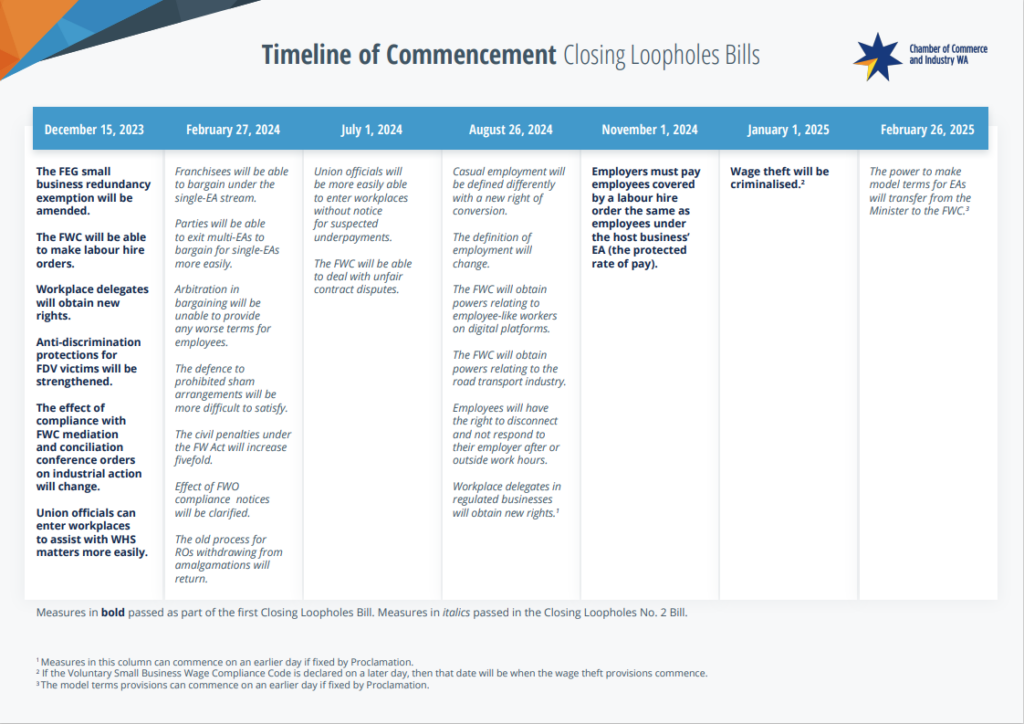The remainder of the Federal Government’s Closing Loopholes Bill, including intractable bargaining provisions, changes to casual employment and the right to disconnect, has passed Parliament – signalling the start of new Australian workplace laws.
Here are the key changes that are going to impact your business:

The following changes were contained in Closing Loopholes Bill Part 1:
Labour hire: same job, same pay
These changes will impact on businesses who engage labour hire and have an enterprise agreement in place. If enterprise agreement terms are better than those for labour hire employees, orders can enforce equivalent rates and conditions as if they were direct hire employees.
Start date: December 15, 2023
Union delegate rights for employees
Union delegates will now have new rights and protections, which include the right to:
- Represent industrial interest of current and eligible members of the union, including in relation to any workplace disputes.
- Reasonable communication with current and eligible members in relation to their industrial interests and reasonable access to the workplace and workplace facilities to do so.
- Reasonable access to paid time during normal working hours for the purpose of delegate training (unless the employer is a small business).
In addition, new protections prevent an employer from unreasonably failing or refusing to deal with delegates; knowingly or recklessly making false or misleading representations to a delegate; and unreasonably hindering, obstructing or preventing the exercise of the rights of the delegate.
Start date: December 15, 2023
Underpayments: criminalisation of wage theft
It will be a criminal offence where an employer is found to have committed wage theft. Wage theft is where an employer:
- is required to pay an amount to (or on behalf of or for the benefit of) an employee;
- “does an act or omits to perform an act”; and
- that act or omission results in a failure to pay the amount in full on or before the day the required amount is due.
- The employer must have intentionally engaged in the act or omission.
Penalties include up to 10 years’ imprisonment for an individual, three times the amount of the underpayment or $1.565 million (whichever is greater) for an individual, or three times the amount of the underpayment or $7.825m for a body corporate (whichever is greater).
Civil penalties for underpayments that do not constitute wage theft will also increase by at least fivefold, so it will be important for employers to undertake regular wage audits to ensure that they are paying their employees correctly.
The new laws also change the definition of serious contravention, from contraventions done knowingly and systematically, to one that is done either knowingly or recklessly. Read more here.
Start date: January 1, 2025
Anti-discrimination
The changes introduce stronger protections against discrimination for employees who have been subjected to family and domestic violence.
This includes new protections for employees who have or are being subjected to family and domestic violence. It also prohibits the inclusion of terms into industrial instruments that discriminate against employees on these grounds.
Start date: December 15, 2023
The following changes were contained in Closing Loopholes Bill Part 2:
Casual employment
There is a new “general rule” for defining an employee as casual, which encompasses an absence of a firm advance commitment to continuing and indefinite work and that the employee is entitled to a casual loading or a specific casual rate. This will be followed by a number of ‘indicia’ which are to be used in this assessment.
Employees will now be able to provide written notification to their employer that they believe they no longer meet the definition of casual employee. The employer will have 21 days to consult with the employee and respond to the notification in writing. The legislation prescribes certain grounds on which the employer can reject the notification.
Expected start date: August 26, 2024
Right to disconnect
Employees will have the right to disconnect and not respond to their employer after or outside work hours. Read more here.
Specifically, the two new workplace rights for employees include:
- An employee may refuse to monitor, read or respond to contact, or attempted contact, from an employer outside of the employee’s working hours unless the refusal is unreasonable; and
- An employee may refuse to monitor, read or respond to contact, or attempted contact, from a third party if the contact or attempted contact relates to their work and is outside of the employee’s working hours unless the refusal is unreasonable.
If an employer takes adverse action against an employee for exercising these new rights, they will be at risk of breaching the general protections provisions.
Expected start date: August 26, 2024
New definition of employment
There is now a new definition to the ordinary meaning of an employee and an employer. This will be used when determining whether a worker is an employee or an independent contractor.
The proposed wording establishes that the relationship is to be determined by ascertaining the real substance, practical reality and true nature of the relationship between the individual and the person and considering the “totality” of the relationship. This not only applies to a written contract but also how it is done in practice and marks a return to the inconsistency of the multi-factorial test that often led to disputes.
Expected start date: August 26, 2024
Employee-like
There is now a new definition of "employee-like" workers who perform digital platform work (gig economy workers) under a services contract, and who meet at least one of the following criteria:
- low bargaining power;
- low authority over the performance of work;
- receives remuneration at or below the rate of employees performing comparable work, or
- other characteristics as are prescribed by the regulations.
The Fair Work Commission (FWC) will have powers to make new minimum standards orders and minimum standard guidelines. There is also an “unfair deactivation” jurisdiction for the FWC to deal with disputes under employee-like workers’ deactivation from a digital labour platform.
Expected start date: August 26, 2024
FIND OUT MORE: VISIT OUR WORKPLACE LAWS HOMEPAGE
Right of entry
Union officials will be more easily able to enter workplaces without notice to investigate suspected contraventions where the FWC is satisfied that the suspected contravention(s) involve the underpayment of wages or other monetary entitlements of a member of a union who performs work on the relevant premises and reasonably believes that advance notice would hinder an effective investigation into the suspected contravention(s). Read more here.
Start date: July 1, 2024
Intractable bargaining workplace determinations
Arbitrated decisions by the FWC in bargaining disputes cannot offer worse terms for employees than those that exist in any pre-existing enterprise agreement.
Under the changes, the terms in a workplace determination, other than wage increase and agreed terms, can be no less favourable to employees or employee organisations compared to a term in an existing enterprise agreement.
This will create a significant disadvantage for employers, who will need to carefully consider bargaining strategies to allow for this outcome in their enterprise agreements as unions will have no incentive to agree to terms that are proposed by employers that are not as favourable as existing terms. Read more here.
Expected start date: February 27, 2024
Changes to enterprise agreements
Franchisees’ access to single-enterprise bargaining
Franchisees of a common franchisor can voluntarily bargain together for a single enterprise agreement. The Fair Work Act will still retain the ability for franchises to bargain for multi-enterprise agreements or to negotiate separate single enterprise agreements on a franchise-by-franchise basis.
Transitioning from multi-EAs
Employers and employers of multi-enterprise agreements will transition to a single enterprise agreement mid-term provided that employees will be better off under the proposed single enterprise agreement.
Model terms for EAs
Model terms for enterprise agreements will be issued by the FWC instead of the Minister for Employment and Workplace Relations.
Expected start date: February 27, 2024
Sham arrangements
The current definition of sham contracting (when misrepresenting employment as an independent contractor arrangement) will change.
Currently, it's not deemed misrepresentation where an employer does not know and is not reckless as to whether the contract is a contract of employment rather than a contract for services (independent contract). The new law requires that the employer reasonably believes the contract is a contract for service, which will result in a more objective test.
Expected start date: February 27, 2024
Road transport
The new laws introduce provisions for independent contractors in the road transport industry, similar to the ones proposed for gig economy workers.
The FWC will have the ability to set a range of minimum standards and guidelines, and there will be access to consent-based collective agreements and dispute resolution procedures for workers within this industry, who are not employees.
It also establishes an Expert Panel for the road transport industry and a Road Transport Advisory Group.
Expected start date: August 26, 2024
Our IR Masterclass has been updated to include all the latest content in the Closing Loopholes Bill.
Given the extent of the changes, it is recommended that all employers review their employment contracts and policies and procedures.
Contact our Employee Relations Advice Centre for more information about how CCIWA’s employment lawyers and HR consultants can assist with this on (08) 9365 7660, or via [email protected]





